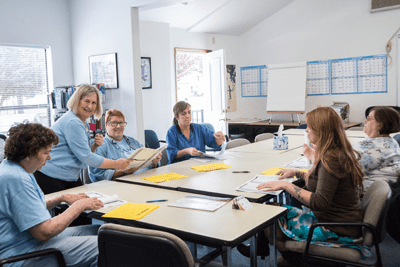Peggy McCarthy was recently named executive director of NAMI Clark County (a local affiliate of the National Alliance on Mental Illness). McCarthy had been serving as interim executive director since April.
Founded in 1979, NAMI Clark County is a not-for-profit organization dedicated to improving the quality of life for those affected by brain disorders – such as bi-polarism, schizophrenia, ADHD, post-traumatic stress disorder, strokes, autism and traumatic brain injury, just to name a few.
According to McCarthy, “groundbreaking changes” are afoot at the national and local level of NAMI.
“[The national organization] has brought in a lot of younger people who understand technology and methods of education,” said McCarthy. She also said that they are recertifying the state NAMI organizations, and each local entity will be re-affiliating as part of that process.
At the local level, McCarthy said they are building new programs and rebuilding old programs.
“We expect exponential growth in the number of people we’re able to reach over the next 12 months,” said McCarthy. The number of email newsletters sent out recently increased from 400 to 700.
Partly driving this growth is the plan to merge Cowlitz County’s NAMI organization with NAMI Clark County, and to add Skamania County to the service area – eventually resulting in a new organization, NAMI Southwest Washington.
New programs
The organization is expanding their crisis intervention training program to include county jail system in addition to law enforcement officers.
“Crisis intervention training is one of our most important programs,” said Ann Donnelly, a local energy consultant who serves as vice president of the NAMI Clark County board of directors. “The police are well informed, and know how to interact with someone with mental illness.”
The new Parents & Teachers as Allies Program will educate local elementary school faculty and administrators to “reduce the stigma of mental illness in the classroom.” McCarthy said they plan to meet with every elementary school in all three counties over the next year.
According to McCarthy, the new vitality at NAMI Clark County is “attracting great people.” They recently hired four interns, as well as a nurse, and have a “huge number of volunteers.” But there is more to be done.
“Businesses come in contact with people with mental illness,” said Donnelly. “It’s a benefit if businesses learn how to deal with it and become active in assisting them.”
McCarthy said they hope to establish a workplace outreach program, similar to the school program. NAMI Clark County recently gave a presentation at the Gifford Pinchot National Forest Service, and she hopes other businesses will invite NAMI to educate employees and management about mental illness.
In addition, said McCarthy, they hope to find employment opportunities for NAMI clients, who have been honing work skills at the NAMI office. Employing such people, she said, helps prevent relapse, which is costly to county government. Businesses can also help with donations, both monetary and in-kind. For example, McCarthy said, NAMI Clark County “desperately needs new computers.”
The need for NAMI
According to McCarthy, one in four Americans experience a mental health disorder each year and mentally ill persons occupy more hospital beds than persons suffering from cancer, lung and heart diseases combined. Donnelly reported that 50 percent of Clark County Jail inmates have a mental illness. McCarthy is working with the county’s district attorney to substitute community service for jail time for individuals with mental illness, which she said would “save the county big dollars.”
Donnelly said the community needs to help government deal with mental illness, through private donations and knowledge sharing.
“If we all work together we can do a great deal more,” she said.
NAMI Clark County offers support groups and classes for families, parents, caregivers, and people with a mental illness. It also provides advocacy and outreach services.
“There is a huge need and we are doing everything we can to meet that need through a wide variety of programs geared to people of all ages,” said McCarthy.






